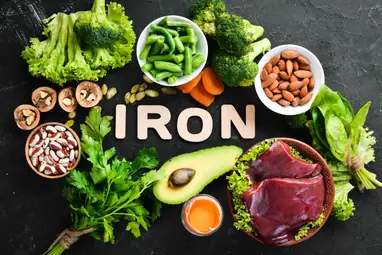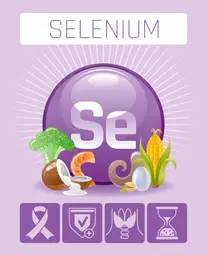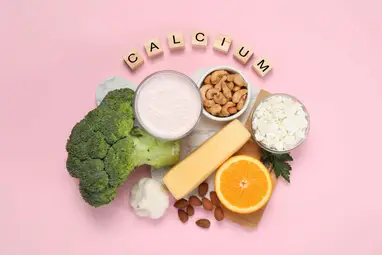Top 10 Sources of Calcium for Vegetarians

Top 10 Sources of Calcium for Vegetarians
Posted on 16th Feb, 2023
Calcium is commonly linked with promoting healthy teeth and bones, but it also has crucial functions in blood coagulation, facilitating muscle contractions, and regulating normal heart rhythms and nerve activities.
Here are 10 great sources of Calcium for Vegetarians:
Fortified breakfast cereal

Many brands of breakfast cereal are fortified with calcium, making them a good source for vegetarians.
Fortified plant milk

Many brands of plant milk are fortified with calcium, making them an excellent source for vegetarians. Almond, soy, and oat milk are all good options.
Tofu

Tofu is an excellent source of calcium, with one cup of raw tofu providing about 860 milligrams of calcium.
Sesame seeds

Sesame seeds are a rich source of calcium, with just one tablespoon containing around 88 milligrams of calcium.
Kale

Dark leafy greens like kale are an excellent source of calcium, with one cup of cooked kale providing around 94 milligrams of calcium.
Bok Choy

This leafy green is also an excellent source of calcium, with one cup of cooked bok choy providing around 158 milligrams of calcium.
Blackstrap molasses

This sweet syrup is a good source of calcium, with just one tablespoon containing around 137 milligrams of calcium.
Almonds

Almonds are a good source of calcium, with just one ounce containing around 75 milligrams of calcium.
Chia seeds

Chia seeds are a good source of calcium, with just one ounce containing around 179 milligrams of calcium.
Broccoli

This cruciferous vegetable is a good source of calcium, with one cup of cooked broccoli providing around 62 milligrams of calcium.
Dosage
The recommended daily intake of calcium varies depending on age and sex. Here are the recommended daily allowances for calcium:
- Infants 0-6 months: 200 mg
- Infants 7-12 months: 260 mg
- Children 1-3 years: 700 mg
- Children 4-8 years: 1,000 mg
- Children 9-18 years: 1,300 mg
- Adults 19-50 years: 1,000 mg
- Women 51-70 years: 1,200 mg
- Men 51-70 years: 1,000 mg
- Adults 71 years and older: 1,200 mg
It is important to note that excessive calcium intake can also have negative health effects, so it's important to talk to your doctor or a registered dietitian to determine the appropriate amount of calcium for your individual needs.
Side Effects and Warnings
Some potential side effects and warnings of taking calcium supplements include:
- Constipation: Calcium supplements may cause constipation, especially when taken in large doses. Increasing water and fiber intake may help alleviate this symptom.
- Kidney stones: Taking calcium supplements may increase the risk of developing kidney stones in some people. This risk is higher for those who already have a history of kidney stones.
- Interference with other medications: Calcium supplements can interfere with the absorption of some medications, including antibiotics, thyroid hormones, and bisphosphonates used to treat osteoporosis. It is recommended to take these medications at different times of the day than calcium supplements.
- Hypercalcemia: Taking too much calcium can lead to high levels of calcium in the blood (hypercalcemia), which can cause symptoms such as fatigue, weakness, nausea, and vomiting.
- Cardiovascular disease: There have been some studies suggesting that high calcium intake, especially from supplements, may increase the risk of cardiovascular disease, although the evidence is not conclusive.
It is important to talk to a healthcare provider before taking calcium supplements, especially if you have any underlying health conditions or are taking any medications. They can advise on the appropriate dosage and any potential interactions or risks.
Conclusion
In conclusion, calcium is an essential mineral that plays a crucial role in maintaining healthy bones, teeth, and muscles. It is important to get the recommended daily intake of calcium from food sources or supplements, depending on individual needs. Taking too much calcium in supplement form can increase the risk of kidney stones and other health problems, so it's important to follow the recommended dosage and talk to a doctor before starting any new supplement regimen. It is also important to note that getting adequate amounts of vitamin D is necessary for proper absorption of calcium in the body.

Health articles from our experts

List of 10 Magnesium Rich Foods

Best Time Of The Day To Take Multivitamins

15 Iron-Rich Foods in India to Increase Hemoglobin

10 Foods Rich In Chromium

Top 12 Uses Of Iron Folic Acid Tablet

Top 10 Zinc Rich Food In India

Top 10 Selenium Rich Foods In India

Top 10 Calcium-Rich Fruits

Top 9 Zinc Rich Food Sources for Vegetarians

